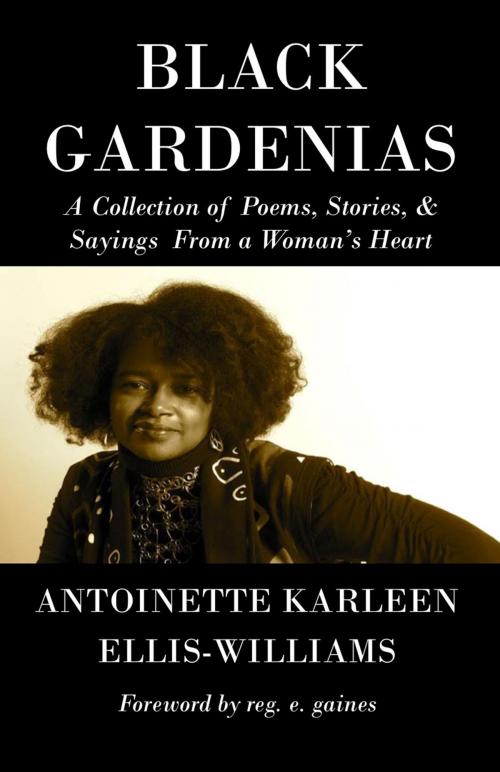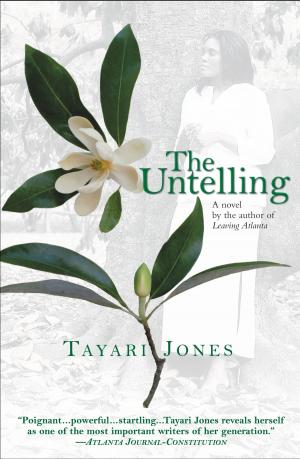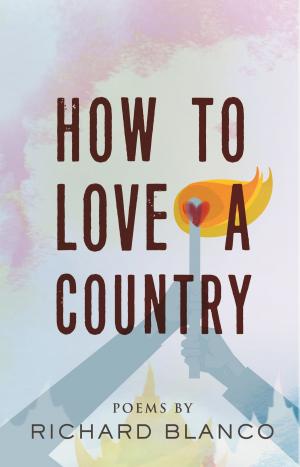Black Gardenias
A Collection of Poems, Stories, and Sayings From a Woman's Heart
Fiction & Literature, Poetry, American| Author: | Antoinette Karleen Ellis-Williams | ISBN: | 9780977257270 |
| Publisher: | Semaj Publishing | Publication: | March 14, 2014 |
| Imprint: | Language: | English |
| Author: | Antoinette Karleen Ellis-Williams |
| ISBN: | 9780977257270 |
| Publisher: | Semaj Publishing |
| Publication: | March 14, 2014 |
| Imprint: | |
| Language: | English |
Black Gardenias explores the history and heritage of Black women, the pleasures and pain of mothering, and nurturing our beautiful children. Just like the title of this book, Black communities have had tremendous obstacles to face, yet they have produced brilliant flowers, e.g. “The rose that grew from concrete” (Tupac, 2007). Sometimes we fill our aching soul with prayers and hymns, remembering stories of slave catchers, branding irons, human cargo, Klansmen’s whips, crooked bosses, nasty teachers who touched us in math class, or cheating lovers; remembering the loss of our innocence or a stolen love affair; or our medical diagnosis these are all part of our Black woman narrative. Stories bring women together and remind us of what it means to be woman in a culture that hates women and an African encased in blackness surrounded by whiteness. This book will explore issues of abuse and identity, hidden from public view. We all have secrets never spoken but they are always present. Secrets that we dare not utter out loud because of the shame they may bring to us, or our people. These secrets are omnipresent hanging thick in the air as the humid summer’s day. We hope to mute their guttural hollas, and whimpering songs with laughter or silence. They are always there. But secrets are not always bad; they are the private dreams, wishes, and possibilities we cherish in a place locked by our own egotistical mind and selfish desires. They are forever hidden giving pleasant relief, memories from mundane reality. They are our friends, the soundtrack we download bopping our heads to their mysterious seductive beats. In this book you will meet several women, like Frances, Rebe, Baby Sue, Nikki, Devon and Mama Olewagi, who want other women to never forget to pass down history, traditions and sometimes secrets to girls burgeoning to womanhood and women afraid to live. Some of these women who want to escape and other women want love and still other women are just doing the best they can. Women who are bold and fight for justice in the face of injustice. Black Gardenias represents the collective memory of voices, stories, pain, laughter and triumphs that Black women share while sewing together threads of unwavering perseverance that unite all of their voices. Black Gardenias is similarly about the journey a black girl takes to womanhood and aging, finding her distinctive placement in family with the expectations of culture to represent “us”. The journey at times is one of necessary isolation but never alone or loneliness. Traveling with the weight of collective expectations and experiences, at times dampers the personal I/me voice. We hear these voices pushing up and through the concrete pavement of essentialism and constructive regressive narratives of the “should be” and “should do”. This book is for people who understand the power of telling stories and speaking truth. Men will get a glimpse behind our cultural veil and historical shroud. Perhaps the poems will permit you the opportunity to understand and renew the journey of mutual respect and solidarity. This book is for every woman and poet to hear the rhythmic beat of ancient struggle and resistance. This is for men who love women, women who love women and people working for justice. It is for the hip-hop artists, educated scholars, people of faith, those looking for something to believe in and those from the school of life. Read this in barbershops, beauty salons, college classrooms, cafes, and on your front porch.
Black Gardenias explores the history and heritage of Black women, the pleasures and pain of mothering, and nurturing our beautiful children. Just like the title of this book, Black communities have had tremendous obstacles to face, yet they have produced brilliant flowers, e.g. “The rose that grew from concrete” (Tupac, 2007). Sometimes we fill our aching soul with prayers and hymns, remembering stories of slave catchers, branding irons, human cargo, Klansmen’s whips, crooked bosses, nasty teachers who touched us in math class, or cheating lovers; remembering the loss of our innocence or a stolen love affair; or our medical diagnosis these are all part of our Black woman narrative. Stories bring women together and remind us of what it means to be woman in a culture that hates women and an African encased in blackness surrounded by whiteness. This book will explore issues of abuse and identity, hidden from public view. We all have secrets never spoken but they are always present. Secrets that we dare not utter out loud because of the shame they may bring to us, or our people. These secrets are omnipresent hanging thick in the air as the humid summer’s day. We hope to mute their guttural hollas, and whimpering songs with laughter or silence. They are always there. But secrets are not always bad; they are the private dreams, wishes, and possibilities we cherish in a place locked by our own egotistical mind and selfish desires. They are forever hidden giving pleasant relief, memories from mundane reality. They are our friends, the soundtrack we download bopping our heads to their mysterious seductive beats. In this book you will meet several women, like Frances, Rebe, Baby Sue, Nikki, Devon and Mama Olewagi, who want other women to never forget to pass down history, traditions and sometimes secrets to girls burgeoning to womanhood and women afraid to live. Some of these women who want to escape and other women want love and still other women are just doing the best they can. Women who are bold and fight for justice in the face of injustice. Black Gardenias represents the collective memory of voices, stories, pain, laughter and triumphs that Black women share while sewing together threads of unwavering perseverance that unite all of their voices. Black Gardenias is similarly about the journey a black girl takes to womanhood and aging, finding her distinctive placement in family with the expectations of culture to represent “us”. The journey at times is one of necessary isolation but never alone or loneliness. Traveling with the weight of collective expectations and experiences, at times dampers the personal I/me voice. We hear these voices pushing up and through the concrete pavement of essentialism and constructive regressive narratives of the “should be” and “should do”. This book is for people who understand the power of telling stories and speaking truth. Men will get a glimpse behind our cultural veil and historical shroud. Perhaps the poems will permit you the opportunity to understand and renew the journey of mutual respect and solidarity. This book is for every woman and poet to hear the rhythmic beat of ancient struggle and resistance. This is for men who love women, women who love women and people working for justice. It is for the hip-hop artists, educated scholars, people of faith, those looking for something to believe in and those from the school of life. Read this in barbershops, beauty salons, college classrooms, cafes, and on your front porch.















